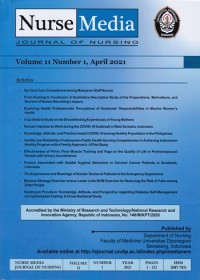
Jurnal
Exploring Health Professionals’ Perceptions of Husbands’ Responsibilities in Muslim Women’s Health
Background: The husband has an important role in women's health. However, the information related to their roles is limited, including from the perspectives of health professionals. The health professionals' support and behavior have influenced men's and women's health behavior.
Purpose: This study aimed to determine the health professionals’ perceptions of husbands’ roles and behavior in women's health, especially in the Muslim community.
Methods: A qualitative descriptive approach applied in this study. Data were collected using the interview method. Ten clinicians from rural and urban areas of West Java, Indonesia, with a range of experience engaging with Muslim husbands involved in this study. Semi-structured interviews were recorded and then transcribed by the researchers. The transcribed data were analyzed using the comparative analysis for the interview technique.
Results: Four main themes were identified: (1) Contextual factors impact husbands' roles in women's health; (2) Extensive roles of Muslim husbands in women's health; (3) Husbands and others involved in decisions about women's health; and (4) Level of health literacy affects husband's actions in women's health and cancer.
Conclusion: Health professionals perceived that husbands' roles in Muslim women's health are pivotal, especially in supporting health treatments in health services. Little information was obtained about husbands' support in cancer prevention and early detection. Nurses can take the lead in improving Muslim husbands' understanding of women's health and cancer and raising their awareness of cancer screening for their wives.
Availability
No copy data
Detail Information
- Series Title
-
Nurse Media Journal of Nursing, Vol. 11 No. 1 April 2021
- Call Number
-
(05) 610.5 DEP n
- Publisher
- Semarang : Department of Nursing, Faculty of Medicine Diponegoro University., 2021
- Collation
-
Hlm. 24-34
- Language
-
English
- ISBN/ISSN
-
2087-7811
- Classification
-
(05) 610.5 DEP n
- Content Type
-
-
- Media Type
-
-
- Carrier Type
-
-
- Edition
-
Vol. 11 No. 1 April 2021
- Subject(s)
- Specific Detail Info
-
-
- Statement of Responsibility
-
-
Other version/related
No other version available
File Attachment
Comments
You must be logged in to post a comment
 Computer Science, Information & General Works
Computer Science, Information & General Works  Philosophy & Psychology
Philosophy & Psychology  Religion
Religion  Social Sciences
Social Sciences  Language
Language  Pure Science
Pure Science  Applied Sciences
Applied Sciences  Art & Recreation
Art & Recreation  Literature
Literature  History & Geography
History & Geography